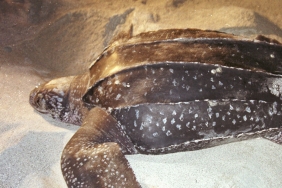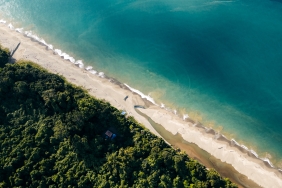EFFORTS TO IMPROVE REEF FISH AND SEA BASS FISHERIES
The issue of IUU (Illegal, Unreported and Regulated) Fishing is indeed one of the government's focuses in protecting fisheries and marine resources in Indonesia. In its application, large-scale fisheries with vessel sizes above 30 GT, cruising power and large capacity are still the main concern. However, in line with this, the condition of Indonesian fisheries, which is also dominated by small-scale fishermen using outboard engines with a capacity of under 7 GT, should not escape the government's attention.
CV. Indotropic Fishery together with WWF-Indonesia has facilitated this process for fishermen identified as a production chain, starting from the Banggai, Banggai Laut to Banggai Kepulauan regions. The facilitation began in December 2019 until February 2020, involving 12 collectors, 105 fishers (as of January 26, 2020) as well as the Syahbandar of Luwuk and Banggai Laut, and the Fisheries Service of Banggai Laut. The process of fulfilling the required documents is carried out in stages. The existence of these two documents is important for fishermen in supporting their fishing practices, as well as easy for companies to trace the chain of goods entering the company.
On the other hand, the challenge of small-scale fisheries is the representation of the availability of catch data, as one of the needs of recommendations in management. Of course, data is important as a basis for making management decisions. Indeed, the condition of this fishery can be classified as a limited data fishery, the RBF (Risk-Based Framework) method can be used as a semi-quantitative approach to assess the condition of reef fish and deep-sea snapper fisheries in the Banggai, Banggai Laut and Kepualauan regions quickly and efficiently. The RBF study was conducted from January to February 2020. This study focused on grouper and snapper by a team from the College of Fisheries and Marine Sciences (STPL) Palu, who went to the field to collect data and information relevant to fisheries.
The results of the RBF study show that the grouper and snapper fisheries that were the focus of the study are in the low to medium risk range, meaning that further management is needed to maintain the condition of these fisheries, so as not to lead to a worse condition, namely over exploited. This further management includes several activities such as more detailed identification of stock conditions, regulation of utilization or catch rules, and supervision of environmentally friendly fishing gear. Although the habitat indicator is still green, there is a warning for ecosystem conditions that are quite vulnerable to damage due to the equilibrium of population dynamics and tropic value elements that change due to utilization pressure. This is in line with the undesirable catch for species classified as ETP (Endangered, Threatened and Protected) such as from the families Carcharhiniformes and Labridae.
As a review and also cross check of the information obtained, the STPL team together with CV. Indotropic and also WWF-Indonesia conducted an RBF workshop in the Luwuk area, Banggai Regency together with relevant stakeholders, including: Banggai District Fisheries Office, PSDKP Luwuk, BKIPM Luwuk, Syahbandar Luwuk, STPL Palu, CV. Indotorpic Fishery, YKAN, WWF-Indonesia and representatives from collectors and fishermen. This activity was conducted simultaneously with the handover of the Small Pass from Syahbandar Luwuk to the fishermen and collector representatives. Collaboration between managers (in this case the government), companies and other fisheries business communities (such as fishermen and collectors) as well as other supporting elements, including support from NGOs and academics, is key to the successful implementation of fisheries improvements in the field towards sustainable and sustainable resources in the future.





